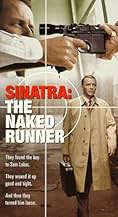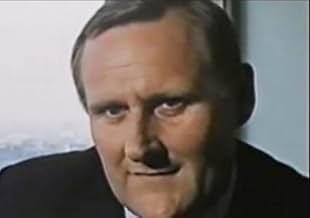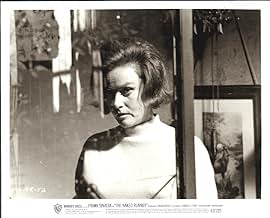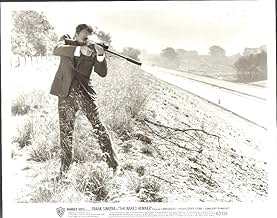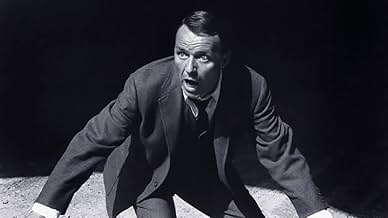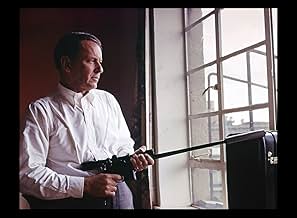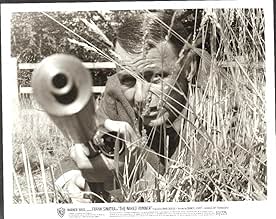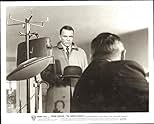NOTE IMDb
5,9/10
583
MA NOTE
Ajouter une intrigue dans votre langueDuring the Cold War, an American industrial-designer living in London is used by the MI-6 as an unwilling pawn in the spy game during a trip to a trade show in East Germany.During the Cold War, an American industrial-designer living in London is used by the MI-6 as an unwilling pawn in the spy game during a trip to a trade show in East Germany.During the Cold War, an American industrial-designer living in London is used by the MI-6 as an unwilling pawn in the spy game during a trip to a trade show in East Germany.
- Réalisation
- Scénario
- Casting principal
Victor Beaumont
- Radio Operator
- (non crédité)
Paul Beradi
- Ministry Man
- (non crédité)
George Curtis
- Man in Passport Queue
- (non crédité)
Stanley Meadows
- Psychiatrist
- (non crédité)
George Murcell
- Frenzl's Guard
- (non crédité)
James Payne
- Man at Printing Press
- (non crédité)
Avis à la une
Frank Sinatra's previous two films had flopped and he was sufficiently impressed with 'The Ipcress File' to work with Sidney J. Furie in this adaptation of Frances Clifford's novel. Although it fared pretty well at the box office as a film it must be accounted a failure. A defector has to be assassinated and British Intelligence is running out of time to find a suitable killer. He has to be sufficiently motivated and a crack shot. Agent Slattery sees a photograph in the paper of former wartime friend Sam Laker and realises that he has found the perfect candidate.......So far so good but thereafter the film falls down. Rather than letting the film speak for itself we are subjected to endless scenes of psycho-babble between a psychiatrist, Slattery and a cabinet minister describing the means employed to get Laker to do the job. Screenwriter Stanley Mann and director Furie have obviously decided to aim their film at the slowest-witted person watching and thereby robbed it of its impact. Also the ending is too abrupt to be satisfying. This is a pity because Sinatra is excellent as Laker and possesses the quality that great stars have of making you care what happens to them. Peter Vaughan and Derren Nesbitt give good support and there is a very nice performance from Toby Robins. Otto Heller is the cinematographer and there is a haunting theme tune by Harry Sukman which Sinatra later recorded as 'You are there' with lyrics by Paul Francis Webster. Critic Philip French coined the phrase 'Sidney J. Furie, signifying nothing'. A harsh judgement but regarding this film it certainly holds true.
I liked the Mauser gun that Sinatra used to kill the unhappy man with glasses. Then, the Romanian Nadia Gray makes a big role from a small part. Peter Vaughan and Derren Nesbitt both steal the film with their special performances. Sinatra is the same as in all his films, it's not bad but not great. Edward Fox has a role too small to show how great he is. Nobody runs naked in this movie, the title was chosen just to attract. In my opinion, the Russians would have boarded Frenzl directly on a plane to Moscow, they would not have
traveled all over Europe, only to play the English game, to psychically prepare Laker-Sinatra for assassination.
This is definitely a typical B-type 1960's European spy thriller, but certainly not bad. Convoluted plot, but the use of extreme close-ups, tasteful melancholy score, and an excellent performance by Sinatra make it worthwhile viewing for fans of Sinatra dramas. His performance is very intense and believable. While the plot is needlessly tangled and premise is farfetched, the film is not at all corny - its presentation is perhaps more difnified than the plot and payoff deserve. Sinatra's performance is the best thing about it. A lengthier, better plot and bigger payoff would have lifted the film up into something near "The Iprcess File" league. The other good aspects of that film are in place here, but this remains a B-level spy thriller despite an obvious attempt to make an A-level thriller. Still, a must-see for Sinatra fans - but perhaps on cable or rental.
Largely underrated by the critics and ignored by the movie-watching public, "The Naked Runner" is a film that definitely deserves your attention. The director, Sidney Furie, who had made the excellent "Ipcress File" two years earlier, shows (again) an instinctive feel for this genre, using many clever camera angles to inject a unique visual style into the picture. Maybe his style is a little too controlled at times (the movie is stiffly paced), but it's also unusually grim and thoughtful. And he also knows how to keep the story comprehensible - which is a relief for anyone who has seen such monstrosities as "The Kremlin Letter". Overall, this is an engrossing thriller, with an ending that's perhaps a little too abrupt, but also with a great, mature performance by Frank Sinatra.
Based on Francis Clifford's novel of the same name, The Naked Runner is an obscure but creditable thriller, and a rarely seen entry in Frank Sinatra's filmography.
To discuss the plot would be to spoil it so I won't do that. Suffice to say, furniture designer Sam Laker is pressured by a friend working for British Intelligence into doing a job in Leipzig to help an old wartime flame... but nothing is as it seems once he reaches East Germany. At that point we are firmly on Le Carre territory, with cross following double cross all the way to the end. And it is the end that is the problem; it cannot carry the weight of everything that has passed before.
The reasons for this are fairly obvious: firstly, in the novel, the reader is as oblivious as Laker as to what is going on and greets every new plot twist with a frustration and incomprehension that Laker shares. This serves to heighten suspense at every level, and Laker's character becomes a fascinating comparison exercise with our own reactions as a reader. The writer of the film, Stanley Mann, chose to place the viewer firmly on the other side of the plot - so we know what is happening to Laker, and why. This serves to undermine him as a character, making him appear hapless, transient, and surly; that Sinatra plays him as such reflects, I think, that he understood as a performer that a narrative mistake had been made. Secondly, the ending is abrupt; indeed Laker's exclusion, you might almost say his quarantine, from the plot is solved by precisely five seconds of hurried dialogue over the end credits of the movie. This is a serious error of judgment that leaves the viewer with a profound sense of disappointment, which is why I've titled this review The Non-Nude Runner: I felt a little robbed.
Apart from the botched ending it is an entertaining yarn. There are excellent performances by Peter Vaughn and Derren Nesbitt. Sinatra is very good too - his performance is low-key and it's obvious he had carefully studied the textbook performance for this kind of role; that of Richard Burton in The Spy Who Came In From The Cold.
Recommended for fans of Sinatra, and followers of cold war thrillers. But make sure you read the book - it's excellent.
To discuss the plot would be to spoil it so I won't do that. Suffice to say, furniture designer Sam Laker is pressured by a friend working for British Intelligence into doing a job in Leipzig to help an old wartime flame... but nothing is as it seems once he reaches East Germany. At that point we are firmly on Le Carre territory, with cross following double cross all the way to the end. And it is the end that is the problem; it cannot carry the weight of everything that has passed before.
The reasons for this are fairly obvious: firstly, in the novel, the reader is as oblivious as Laker as to what is going on and greets every new plot twist with a frustration and incomprehension that Laker shares. This serves to heighten suspense at every level, and Laker's character becomes a fascinating comparison exercise with our own reactions as a reader. The writer of the film, Stanley Mann, chose to place the viewer firmly on the other side of the plot - so we know what is happening to Laker, and why. This serves to undermine him as a character, making him appear hapless, transient, and surly; that Sinatra plays him as such reflects, I think, that he understood as a performer that a narrative mistake had been made. Secondly, the ending is abrupt; indeed Laker's exclusion, you might almost say his quarantine, from the plot is solved by precisely five seconds of hurried dialogue over the end credits of the movie. This is a serious error of judgment that leaves the viewer with a profound sense of disappointment, which is why I've titled this review The Non-Nude Runner: I felt a little robbed.
Apart from the botched ending it is an entertaining yarn. There are excellent performances by Peter Vaughn and Derren Nesbitt. Sinatra is very good too - his performance is low-key and it's obvious he had carefully studied the textbook performance for this kind of role; that of Richard Burton in The Spy Who Came In From The Cold.
Recommended for fans of Sinatra, and followers of cold war thrillers. But make sure you read the book - it's excellent.
Le saviez-vous
- AnecdotesWhile filming L'île des braves (1965), Brad Dexter had apparently rescued Frank Sinatra from drowning when he got into difficulty swimming. As a thank-you, Sinatra agreed to star in this film when Dexter was starting out as a producer; however, it was reported that he was very difficult throughout the filming and gave Dexter and director Sidney Furie many headaches.
- ConnexionsReferenced in I Am Woman (2019)
- Bandes originalesYou Are There
Music by Harry Sukman, Lyrics by Paul Francis Webster
Performed by Harry Sukman Orchestra
Meilleurs choix
Connectez-vous pour évaluer et suivre la liste de favoris afin de recevoir des recommandations personnalisées
- How long is The Naked Runner?Alimenté par Alexa
Détails
- Date de sortie
- Pays d’origine
- Langue
- Aussi connu sous le nom de
- The Naked Runner
- Lieux de tournage
- Sociétés de production
- Voir plus de crédits d'entreprise sur IMDbPro
- Durée1 heure 41 minutes
- Mixage
- Rapport de forme
- 2.35 : 1
Contribuer à cette page
Suggérer une modification ou ajouter du contenu manquant

Lacune principale
By what name was Chantage au meurtre (1967) officially released in India in English?
Répondre
